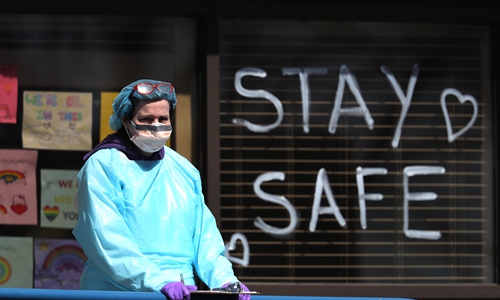Nobody accountable in US despite rising virus deaths
By Shi Tian Source:Global Times Published: 2020/4/16 21:33:41

A Medical professional looks on at a drive-thru coronavirus testing site run by ProHealth Care on April 06, 2020 in New York. Photo: AFP
"Federalism" has been a trending topic in the US, as President Donald Trump and some state governors were involved in a public spat over each other's authority amid the pandemic. Such debates not only do no good to the coun-try's handling with the deadly virus, but have exposed a critical problem in this great power - the absence of accountability mechanism.
The anti-pandemic fight is a war without the smoke of gunpowder. It even de-mands more close coordination within a country from the top down and col-laboration between authorities at all levels than in wartime. The accountability system, in this process, is the key. It can to the greatest extent ensure that officials are doing practical things in their suitable positions and so guarantee that the safety of the people is truly protected.
In the US, although technically there are some administrative oversight and accountability mechanisms, they have performed practically no function dur-ing the outbreak.
First, the US might have paid so much attention to defining the "responsibility" of China and others that it left no time to spare for investigating its own officials. The depressing situation in the US, where more than 640,000 have been infected and around 30,000 killed, is inseparable from the inaction and incompetence of government officials. But has anyone been held accountable since the outbreak?
In China, throughout the epidemic, hundreds of officials at different levels have been punished. For example, solely in Kunming, capital of Southwest China's Yunnan Province, 342 have been held accountable for malpractice and misconduct as of March 17. And just on Wednesday, officials in Harbin, Northeast China's Heilongjiang Province, were criticized for failing to contain the virus spread following recent clusters of infections.
If some US officials were working in China, they would certainly be removed from office. The US, however, has focused only on the buss-packing game with other countries and even international organizations, but neglected its own officials' mistakes.
Second, decentralization has hampered the implementation of the administrative accountability system in the US.
In China, the central and local authorities have always worked as a whole in dealing with the epidemic. In late January, after the central government in-spection team reviewed treatment and prevention procedures in Huanggang, Hubei Province, the city's health commission head, was removed for negli-gence on epidemic treatment capabilities.
In the US, however, while millions of lives are threatened by the virulent dis-ease, the country is still witnessing endless disputes instead of full coopera-tion between the federal and state governments. How could people expect officials to be held responsible s in such a country?
Third, the cumbersome procedures for investigating accountability may have also served as a negative factor. The impeachment trial of Trump was, in fact, a manifestation of the US' administrative accountability mechanism, and it took more than four months to conclude.
In China, as early as on February 5, more than 100 officials throughout China have been punished. But in the US, if there is indeed someone that is to be held accountable for his/her improper handling of the outbreak, the epidemic situation would perhaps have already been irremediable by then.
Through the two countries' dealing with the outbreak, differences between the two governing systems are plainly visible. And the reason why the US failed to bring the situation under control can also be seen. It is hoped that the US can enable the accountability mechanisms to come into play and focus truly on its people's lives.
Posted in: OBSERVER,CHINA-US